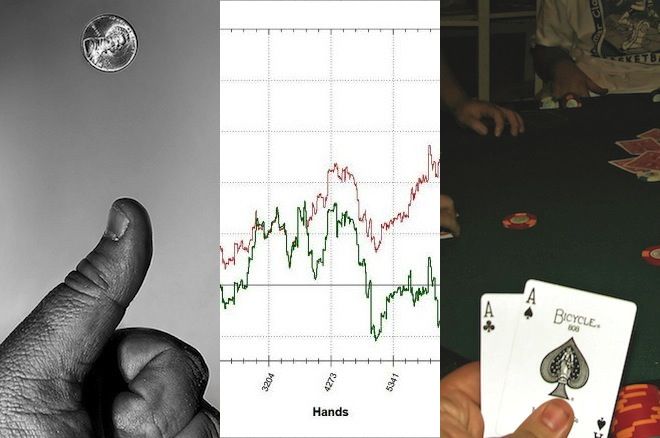

I wish to introduce you to a device with the intention to will let you answer some poker probability questions that may be done in no other way.
Let me confess this prematurely: Today's subject isn't fun or sexy. But when you're employed throughout the examples with me, and take a look at a few of your own, I BELIEVE you can see it useful.
The tool is the binomial calculator. It's used to figure out the probability of a given collection of outcomes of a few type, from a bigger collection of trials.
Coin flips
For example, say you flip a coin 100 times, and you're surprised to search out that you just got 60 heads and 40 tails, quite removed from the anticipated 50-50 distribution. You desire to know exactly how unlikely this outcome was.
Go to an internet binomial calculator (here's one). It's a must to give it three parameters:
- The probability that a coin toss leads to heads, that's 50% or 0.5.
- The collection of trials you conducted, which this is 100.
- The selection of those trials that led to the end result you're interested in, that's 60 heads. (MESS AROUND with it, and you will discover that the consequences for 40 tails are the same, as they ought to be.)
The calculator then tells you that the probability of having exactly 60 heads in 100 coin tosses is 0.0108, or a hair over 1%.
A separate line within the results also answers a related question: What's the probability of having a minimum of this skewed an outcome, that is, 60 or more heads in 100 trials? It's 0.028, or 2.8%. In other words, for those who add up the probability of having 60 heads, 61 heads, 62 heads, and so on, the answer's that out of all of the times you do a collection of 100 coin flips, you're going to get 60 or more heads in as regards to 3% of them.
Now let's turn to poker applications.
Aces
Yesterday I played poker for approximately four hours, and was dealt pocket aces three times, which struck me as pretty unusual — in fact, that is what prompted me to write down about this subject today. Let's say I saw 30 hands per hour, so a complete of about 120 hands. How improbable is it to get pocket aces thrice out of 120 hands?
First we need to determine the probability of having ![]()
![]() in anybody hand. It's possible you'll know off the highest of your head that it's 1/221 — but when you don't, it is simple to calculate. The probability of the primary card being an ace is 4/52, or 1/13. After that happens, there are 51 cards left within the deck, of which three are aces, so the probability of the second one card being an ace is 3/51, or 1/17. The combined probability, then, is 1/13 x 1/17, or 1/221. We have to express that as a decimal to go into it into the binomial calculator — it's 0.0045.
in anybody hand. It's possible you'll know off the highest of your head that it's 1/221 — but when you don't, it is simple to calculate. The probability of the primary card being an ace is 4/52, or 1/13. After that happens, there are 51 cards left within the deck, of which three are aces, so the probability of the second one card being an ace is 3/51, or 1/17. The combined probability, then, is 1/13 x 1/17, or 1/221. We have to express that as a decimal to go into it into the binomial calculator — it's 0.0045.
Our choice of trials is 120, and our selection of successes is 3. Installed all three of these variables, and the calculator tells us that the probability of having exactly three pairs of aces in 120 hands is 0.015, or about 1.5%. The probability of being a minimum of that lucky, i.e., being dealt three or more pairs of aces in 120 hands, is purely slightly higher — 1.7% — since the possibilities of getting four, five, and more are each so tiny.
So my gut feeling was right. Yesterday's cornucopia of aces really was unusual. I WILL expect that sort of luck lower than 2% of the time.
Suppose, instead, that I had had a dry spell of aces — none in any respect. How unlucky would I NEED TO be for that to have happened? We enter the similar probability for every deal and the similar selection of hands (trials), but 0 for the selection of successes. The calculator spits out a probability of 0.58, or 58%.
In other words, a bit of over half the time that I play a session of 120 hands, I'll see no pocket aces. That isn't especially unlucky, but just par for the course.
Big pairs
Let's expand this further. Yesterday I USED TO BE also dealt pocket kings once and pocket queens twice. We'll lump these at the side of the aces under "big pairs," meaning I had a complete of six such pairs in my 120 hands.
On anyone deal, the probability of having kings is equal to that of having aces — 1/221. The similar is correct for queens, or some other pair. So the combined probability of having aces, kings, or queens on any hand is 3/221. In decimal form, that's 0.0136.
We put that into the calculator in conjunction with 6 as my collection of successes, keeping the choice of trials at 120. We discover that the probability of having exactly six big pairs in 120 hands is simply 0.0013, or about 0.1%. But what we're really fascinated about is the probability of being a minimum of that lucky with the massive pairs. For that, we glance to the solution box in regards to the probability of "X ≥ 6," that is 0.006, or 0.6%.
Conclusion: Only about six times in every thousand sessions of 120 hands of hold'em poker am i able to expect to get six or more big pocket pairs as starting hands. My game yesterday was a real statistical outlier.
Losing streaks
Let's turn to an absolutely different more or less poker application.
Suppose you have been in what looks like a foul slump of cash-game sessions. You play every day, but in September had just 10 winning sessions out of 30. You need to understand how likely that is to happen.
First we have to know the probability of winning or losing in any given session. For that, it's important to have a reliable, long-term record. (You do have that, right? If not, it is a problem you desperately want to fix.) Let's suppose over several years you will have won 65% of the time and lost 35%. The duty for the binomial calculator, then, is to figure out the probability of getting only 10 winning sessions in 30 trials, when the probability of a win is 0.65.
The answer is lots less than you almost certainly think — it's 0.0001, or 0.01%. If you've played numerous poker on a typical basis, it's possible you'll think it is not too surprising to have a slump like 20 losses in 30 sessions, even if one can be a consistent winner. And you're right — it isn't unusual in real life, by no means anything just like the 1-in-10,000 rarity that the maths says. So what is going on on?
Unlike the former problems we calculated about coin tosses and what cards you're dealt, whether you win or lose in any given session isn't a purely random event. It depends upon how well you're playing, how well the opposite individuals are playing, how long you play, and other variables. However the calculator assumes that randomness is the one thing determining the results.
Going back to the coin-flip outcomes, in the future the probability is so low that the safest conclusion isn't that you've got just witnessed an immensely unlikely event, but that the coin isn't, in fact, as fair as you had previously assumed. Similarly, given the very low probability of the observed losing streak for September, the logical conclusion is that your slump is not because of chance alone.
By this means, the binomial calculator tells you that something hugely non-random was tanking your win rate, and also you want to set about understanding what it is, so to fix it. (Hint: The primary place to seem for a culprit is within the mirror.)
Tournaments
One more example: You have been playing the similar online poker tournament each day for a year — 365 entries. It usually pays 10% of the players. You've cashed 40 times, that is clearly better than the 36.5 that will be expected if the entire players were equally skilled, in order that only luck determined the winners. But is it enough greater you can conclude that you are better than your average opponent, or have you ever just been just a little luckier than they are?
Once more to the binomial calculator! We now have 365 trials, 40 successes, and a probability of success of 10% or 0.1.
The calculator spits out about 24% because the likelihood that you would have exactly 40 cashes. More important is the "X ≥ 40" probability, that's about 29%. That is, if the entire entrants in these tournaments had the exact same skill, 29% of them would have a frequency of cashing that may be nearly as good or better than yours. Sorry, but if nearly one-third of your competitors would match your success by luck alone, your results aren't proving that you are meaningfully better than they are.
But what you probably have 45 cashes in place of 40? It sort of feels like not much of a difference, however the math says otherwise. Now the calculator shows that just 8% of entrants of average skill would get results nearly as good or better than yours. That's coming into a low enough probability that it's reasonably safe to imagine that you've a real skill edge at the field.
Conclusion
"Binomial calculator" is more or less a strange, intimidating name, but it really isn't hard to use, and it means that you can answer some sorts of poker math problems that might be impossible without it.
Robert Woolley lives in Asheville, NC. He spent several years in Las Vegas and chronicled his life in poker at the "Poker Grump" blog.
Photos: "Honest Abe," jeff golden CC BY-SA 2.0; "Pocket Aces," Eliya CC BY 2.0.
Be certain to complete your PokerNews experience by trying out an summary of our mobile and tablet apps here. Stay on top of the poker world out of your phone with our mobile iOS and Android app, or fan the flames of our iPad app for your tablet. You can too update your individual chip counts from poker tournaments world wide with MyStack on both Android and iOS.
PokerNews.com is the world's leading poker website. Among other things, visitors will discover a daily dose of articles with the newest poker news, live reporting from tournaments, exclusive videos, podcasts and such a lot more.
PokerStars is the biggest online poker room offering the most important amount of poker games and different game variations including Texas Hold'em, Omaha and other popular poker games. By joining PokerStars you'll easily learn all of the poker rules and poker strategy by playing free poker games. Join PokerStars and revel in high quality online poker.

Read More... [Source: PokerNews]
No comments:
Post a Comment